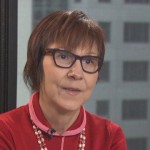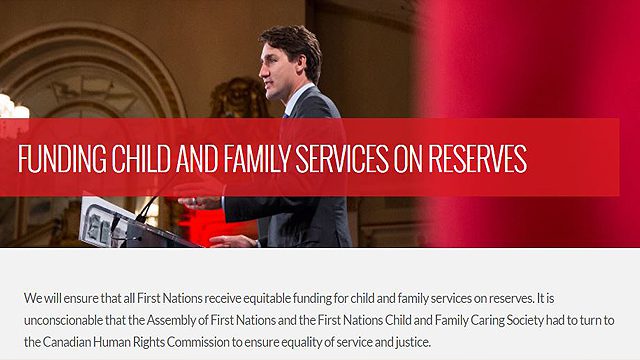APTN National News
OTTAWA—First Nation children’s advocate Cindy Blackstock has sent a letter to Prime Minister-designate Justin Trudeau calling on his government to bring in legislation within its first 100 days of power to immediately deal with the crisis situation faced by on-reserve by child-welfare agencies.
Blackstock, who heads the First Nation Child and Family Caring Society, said she is hopeful the Trudeau-led Liberal government will make the necessary policy changes to “resolve the serious and ongoing discrimination of First Nation children living on-reserve.” She said the new Liberal government can’t let the issue continue to drag on.
“What we need is for someone to get into that office and first of all recognize that what has happened is racial discrimination, not just against First Nations children, but against First Nation adults who are deprived clean glasses of water,” said Blackstock, in an interview with APTN. “And put that publicly on the record so that we all see when we hear it and we’re no longer willing to tolerate it and the government therefor is compelled to address it.”
It has been more than a week since the Liberals won the federal election and Blackstock still seems have an extra skip in her step.
And why not.
Under Stephen Harper’s Conservative government, Blackstock has been kicked out of meetings, spied on, retaliated against and has spent thousands of dollars on a case before the Canadian Human Rights Tribunal alleging the government discriminates against First Nations children in care. It’s a case Ottawa fought every step of the way.
“It has been ten dark years for First Nations kids. I don’t know what’s coming with the new Liberal government in terms of how things will change on the ground for First Nation children, but at least there’s a possibility of having a conversation with them,” said Blackstock. “On a personal level, it was the first glimpse of maybe feeling safe again as a human rights advocate in this country.”
In 2007, Blackstock and the Assembly of First Nations (AFN) hauled Ottawa before the Canadian Human Rights Tribunal alleging that Canada paid First Nation child welfare agencies less than provincially funded agencies.
Eight years after she first brought the complaint forward, the Tribunal has still yet to make a decision.
But Blackstock said Trudeau doesn’t have to wait for the ruling.
“You don’t have to wait for that tribunal decision,” said Blackstock. “Because children at that level of development require immediate action.”
The Liberal platform did mention the plight of thousands of First Nations children caught up in the welfare system.
“As part of this new fiscal relationship, we will also make sure that all First Nations receive equitable funding for child and family services provided on reserves,” the platform said.
And if a statement sent to APTN National News by Liberal Carolyn Bennett is any indication, if the government loses before the Tribunal, there won’t be an appeal.
“We believe this should never have gone to the Tribunal in the first place,” said Bennett. “It is unconscionable that the AFN and the First Nations Child and Family Caring Society had to turn to the Canadian Human Rights Commission to ensure equality of service and justice.”
Despite Bennett’s reassurance First Nations children will be taken care of, the issue is not costed out in the Liberal plan, unlike education.
The shortfall according to Blackstock is about $122-million annually.
But Blackstock said much more is needed just to get agencies back into working order.
“We know that they had said they should have invested $500-million in child welfare for equity over the past 5 years, money they didn’t invest,” she said.
And if a report released in July is any indication, there’s a lot of work to do.
According to the Aboriginal Children in Care working group, of the 30,000 children in state care in Canada, 48 per cent are First Nation, Metis or Inuit while the overall population of Indigenous peoples makes up only 4.3 per cent of the population.
Blackstock isn’t the only one waiting or demanding change.
The day after the election, the Canadian Human Rights Commission sent Trudeau a list of recommendations to “repair” human rights in Canada.
Commissioner Marie-Claude Landry wrote a very pointed message that outlined her concerns with legislation that has been passed by the previous Harper government.
“I call on our newly elected Parliament to begin repairing the erosion of human rights in Canada, and to move swiftly to repeal legislation and reverse policies that promote discrimination and prejudice,” said Landry in a statement. “No one should live in fear because of who they are or because they have a belief that is not shared by the majority.”
The Commission sent a list of recommendations for the new Parliament, now made up of 338 seats, to start work on.
The recommendations include calls to:
- Rewrite and rename the Zero Tolerance for Barbaric Cultural Practices Act, to remove any insinuation that certain religions are a threat to Canadian society.
- Accelerate the process for bringing in refugees and asylum seekers fleeing war, persecution and environmental devastation, and ensure that the selection process is not discriminatory.
- Ensure that the arbitrary detention and imprisonment of thousands of undocumented people seeking asylum in Canada, many of whom are suffering from mental illness, is brought to an end.
- Immediately convene a national inquiry into missing and murdered Indigenous women and girls, and develop a national action plan.
There was no mention in Landry’s release about Blackstock’s complaint which the Commission sent to the Tribunal for further investigation.
The Tribunal heard from dozens of parents, administrators, chiefs and government bureaucrats on how First Nation child welfare agencies are funded and how many struggle under incredible workloads with few resources.
About 90,000 records were disclosed during the hearings outlining detailed financial reports and mind-numbingly complicated calculations that agencies need to understand before they can apply for funding.
The hearings ended in the fall of 2014, and the parties are hopeful a ruling will come down before the end of the year.
Until then, Blackstock said she’d like to have a sit down with the prime minister-designate.
“If the government is serious about addressing the long standing injustices of First Nations children, then they should be taking action immediately,” said Blackstock.
















